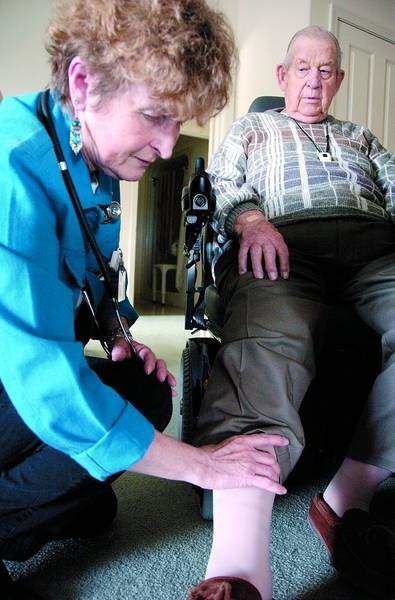St. Charles home care faces change
Published 5:00 am Thursday, May 25, 2006

- Lucy Snekvik, a registered nurse with St. Charles Home Health Services, checks 95-year-old patient Jim Vlcek for swelling in his legs.
After losing hundreds of thousands of dollars over the past two years, the St. Charles Home Health Services program has brought in outside consultants to evaluate its operations.
A review conducted by The Corridor Group of Kansas in April showed some significant changes could improve the program’s financial performance, said Jim Diegel, acting CEO of Cascade Healthcare Community, the parent company of St. Charles Home Health Services, as well as the hospitals in Bend and Redmond.
Trending
The program provides services including physical, occupational and speech therapies along with in-home nursing care to about 2,200 patients a year, said Jerrie Melton, administrator of the program, in an interview in April.
Due mostly to changes in Medicare reimbursement rates, the program has suffered operational losses, Diegel said. St. Charles Home Health lost $742,000 in 2005, $602,000 in 2004 and $93,000 in 2003.
”We are largely Medicare funded. Medicare is not as good a payer as it used to be,” Melton said. ”Home health agencies across the country have had some real challenges with the payment systems since 1997 when the balanced budget was passed.”
Starting in October 2000, Medicare changed the way it reimburses for home health services, according to the National Association for Home Care and Hospice. The change initially caused more than 3,000 home health agencies in the nation to close.
Diegel said he believes most of St. Charles Home Health Services’ financial losses have been caused by the changes to the Medicare system; a loss of productivity when the hospital’s new electronic medical records system was introduced; escalating operating costs; and a lack of focus on growing the patient market.
The Corridor Group, which focuses on home health consulting, visited St. Charles Home Health for two days in April to conduct an overall operations review.
Trending
Now that Cascade Healthcare has received a final report from the consultants, Diegel said changes – including bringing on an interim administrator knowledgeable in the industry – will go into place.
Melton, who has served as administrator for 18 years, will leave her position as of Friday, Diegel said. He made the decision last week to change the program’s leadership, expressing a desire for ”a fresh set of eyes and a different vision for the agency going forward.”
Melton could not be reached for comment on her departure.
Diegel also said employees of the program will be better trained in the Medicare reimbursement system and that St. Charles Home Health will work toward developing new service programs.
The goal, at this point, is for St. Charles to continue providing home health services, he said. The program employs close to 90 people and has been operating in Central Oregon since 1966, although the hospital has only owned it since 1984. The program was previously operated by county health departments.
St. Charles Home Health’s story is not uncommon nationwide, said Mary St. Pierre, vice president for regulatory affairs for the National Association of Home Care and Hospice.
”I know it’s real tough for those small agencies,” she said, ”they just don’t have the revenue stream.”
Her office offers advice to home health organizations on how to boost income, despite government reimbursement rates.
Some of St. Pierre’s tips include diversifying patients to bring in more people with private insurance; implementing telehealth systems where nurses can check in on patients without making the trip to their home; and training employees to accurately assess the patient’s needs during the initial evaluation.
Heidi O’Connor, vice president of client services for The Corridor Group, said those are generally all areas where home health agencies struggle. O’Connor declined to comment specifically on the St. Charles Home Health review.
Her group evaluates every step of home health care, from the way patients are referred for services through their discharge, billing and collections.
”(Under Medicare) home health is reimbursed on a per-case basis, as opposed to a per-visit or fee-for-service basis. You used to send out a nurse and you would get something like $100 for that visit,” O’Connor explained. ”Now, you get a fixed amount for a 60-day episode of care.”
What drives the reimbursement for that care, she said, is mostly the initial diagnosis and evaluation of the patient. Training home health nurses to more accurately make those assessments can help them achieve more appropriate reimbursements.
Along with changing reimbursement rates, many home health agencies are experiencing increased competition, O’Connor said.
”Patients have choices. They know that they have choices. They, in a sense, are accountable for their own health care,” she said. ”I think it is a good thing. There is increased competition in all markets.”
In Central Oregon, there are several agencies providing home health care and not all of them are struggling. Central Oregon Home Health and Hospice has been operating in the area since 1984. During the time St. Charles Home Health has experienced financial difficulties, Central Oregon Home Health has not had the same problems, said CEO Steve Westberg.
”We try to focus on providing the best possible patient care,” Westberg said. ”You’ve got to be incredibly careful with your overhead. To provide the level of patient care we provide, we’ve got to be very smart with the overhead.”








